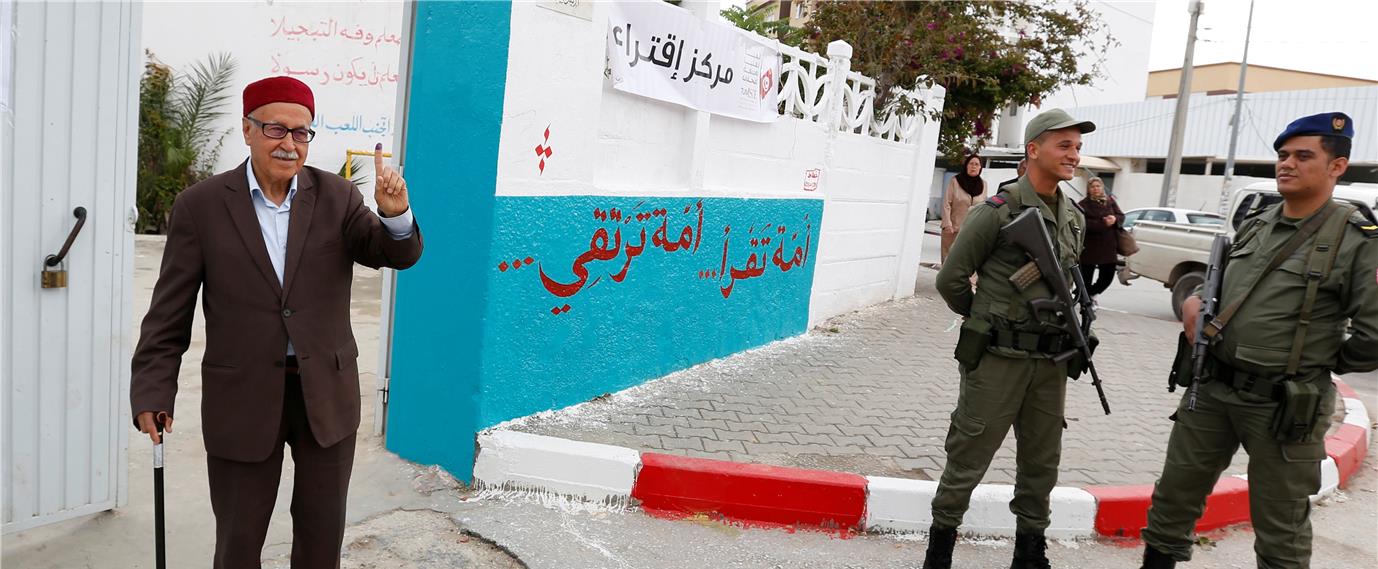قبل أقل من سبع سنوات، لم يكن هناك سوى صوت واحد خاضع لأوامر السلطة الحاكمة ورقابتها المكبلة. وفي الصحافة، كان المحتوى المعروض يدور في فلك إطار يتماشى مع منظومة بن علي القمعية، فلا اعتراض ولا تجاوز. ظلَّ الإعلام التونسي على هذا الحال كثيرا حتى أقبلت ثورة الـ 14 من يناير، فقلبت أسس عمله ومفاهيمه وأتاحت له نسبيا فرص كسب الاستقلالية، بعيدا عن منطق الإخضاع وسنين الإكراهات الطويلة زمن حكم زين العابدين بن علي.
انعكاس التحولات السياسية في تونس على واقع الإعلام
كانت لحظة رحيل بن علي إحدى أهم أسباب خروج الإعلام التونسي من حالة الانكماش إلى التفتح، وكان طبيعيا أن يدخل الإعلام في مرحلة الارتباك بعد فاصل الثورة، وذلك للتحرر تدريجيّاً من تبعات زمن القمع؛ فثلاث وعشرون سنة كافيات لصبغ هذا الأخير بصبغة السلطة وإصابته بحالة تصلب تشل حريته كسلطة رابعة مستقلة بذاتها. فحتى بعد مرور سنين على الثورة البكر في تونس، ودخول البلاد في مرحلة التصويت والانتخاب الحر، لوحظ الارتباك المتباين في أداء العمل الإعلامي، وتطلب الأمر ردحا من الزمن ليستوعب الإعلام التونسي والإعلاميون المبادئ الجديدة في نقل الكلمة بكل حرية، ويدركوا كيفية التعامل مع الظروف السياسية الحساسة بعيدا عن قبضة السلطة وقيود الساسة. فحال الإعلام في التغطية الانتخابات البلدية الأخيرة، ليس حال تغطية الانتخابات التشريعية والرئاسية سنة 2014.
الأداء الإعلامي في طور التحسن
تقرير صدر عن الهيئة المستقلة للاتصال السمعي البصري التي تعنى بتعديل قطاع الإعلام، أكدت فيه أن التغطية الأخيرة للانتخابات البلدية التونسية اتسمت بالإنصاف والنزاهة والعمل وفق الالتزامات المهنية والأخلاقية. نوري اللجمي، رئيس الهيئة العليا المستقلة للاتصال السمعي البصري تحدث لمجلة الصحافة.. "لقد أصدرنا مسبقا مرسوما مشتركا مع الهيئة العليا المستقلة للانتخابات، لضبط قواعد التغطية الإعلامية. يتضمن هذا المرسوم أربعة وثلاثين فصلا، أردنا من خلاله الحد من الاختلالات التي تصاحب عمليات التحول كالانتخابات.. وفي هذه التغطية الإعلامية للانتخابات الأخيرة لاحظنا أن الإعلام قد أنجز تغطية منصفة ودورا مهما، باعتبار التزام الإعلاميين وانضباطهم وفق الشروط، وهذا يُعدُّ إيجابيا في تاريخ الإعلام التونسي الذي بدأنا نلاحظ الفرق في وعيه وحسن تمرسه بعد سبع سنوات على الثورة، فصحيح أن المناخ الجديد في تونس أسس للإعلام فرصة، وحرية تامة للعمل وفق القيم والمعايير المهنية".
وعن النقلة النوعية في المشهد الإعلامي بعد الثورة، يضيف اللجمي.. "ما زلنا نعاني بعض الأخطاء، لكن حال الإعلام في تحسن ونحن نعمل على وضع الأسس الجيدة في عمل الإعلام والإعلاميين، حتى لا تتحول الحرية التي ظفر بها إعلامنا بعد الثورة إلى انفلات".
منوبي المروكي أكاديمي بمعهد الصحافة وعلوم الأخبار ورئيس مجلس الصحافة رأى بدوره أن الإعلام توج بملاحظات حسنة في الأداء الأخير.. "بالنسبة للإعلام السمعي البصري، فقد وضعت الهيئتان كما نعلم (الهيئة العليا المستقلة للاتصال السمعي البصري والهيئة العليا المستقلة للانتخابات)، حدود التغطية الإعلامية بالنسبة للتلفزيونات والإذاعات ومنعت كل أنواع الإشهار السياسي مسبقا. لكن ليس هذا فقط، فالإعلام بدوره وضع على عاتقه مسؤولية كبيرة وهناك حرفية كبيرة تُلاحظ، ووعي يتلاءم مع التمشي الجديد للديمقراطية. هذا بالنسبة لعمل المحطات التلفزيونية والإذاعات، لكن بالنسبة للصحف مثلا، ففي صحيفة لوتون، اقتصرت التغطية فقط على الجانب العام للحملة الانتخابية وليس ذكر القوائم الانتخابية والأحزاب بصفة مستثنية".
الشروط من وجهة نظر الصحفيين
فاطمة العبدلي صحفية ميدانية بقناة حنبعل كانت شاهدة على التحول في التغطية الأخيرة للانتخابات البلدية، مقارنة بالانتخابات البرلمانية والرئاسية، وربطت ذلك بتغير السلوك لدى الصحفيين أنفسهم، بالإضافة إلى المرسوم الذي وضعته الهيئتان لتنظيم وتقديم رؤية للتغطية تحدُّ من عمل من يبغي إخلال العملية الديمقراطية، ويهدم مقومات العمل الصحفي النزيه.. "لم تعترضنا أية صعوبات في العمل الميداني، فالهيئة الانتخابية وفرت جميع الملتزمات للصحفيين وفريقها الإعلامي حرص على توفير المعلومة الآنية لنا في كل لحظة.. وحتى الإرسال التلفزي تم ربطه بالمحطات التلفزيونية، ما أتاح الوصول مجانا إلى تمرير الندوات الصحفية الآنية والمباشرة. بالنسبة للشروط التي وضعتها الهيئتان مسبقا، لم تقلقنا كصحفيين فلا تعتبر تعجيزية بالنسبة للصحفي. لقد التزمنا بها وحاولنا إلى أقصى حدٍّ احترامها. وقد وفَّقنا الله في ذلك، فأنا شخصيا لم ألحظ إخلالا مهنيا فاضحا، وأود الإشارة أن هذا الميثاق المسبق للتغطية والقواعد التي ضبطت بينت لحد كبير وغربلت القنوات التي تغطي بهدف الدعاية السياسية والقنوات التي هدفها إيصال المعلومة إلى الرأي العام بكل شفافية والتزام.. فهناك قنوات انسحبت من التغطية وأعفت نفسها من ذلك، وهذا يعود إلى استنتاجها أن هذه الشروط، مثل ضبط وقت التغطية والابتعاد عن ترويج خطاب الكراهية والتعبئة السياسية وتغليب طرف على طرف وضبط العقوبات التي يمكن أن تعاقب بها الوسيلة الإعلامية في حال تمريرها إشهارا سياسيا. هذه الجملة من الشروط لم تستوعبها فانسحبت من التغطية، ما يثبت نيتها المسبقة في تعكير صفو التحول الحسن في أداء الإعلام في العمليات الانتقالية".








































